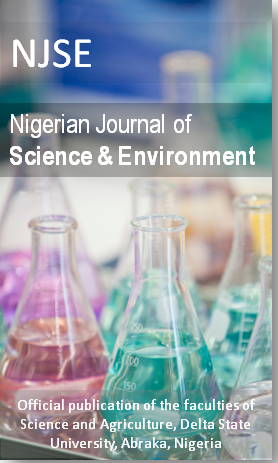
NIGERIAN JOURNAL OF SCIENCE AND ENVIRONMENT
Journal of the Faculties of Science and Agriculture, Delta State University, Abraka, Nigeria
ISSN: 1119-9008
DOI: 10.5987/UJ-NJSE
Email: njse@universityjournals.org
EMPIRICAL MODEL FOR LEADERSHIP ASSESSMENT UTILIZING CLUSTERING EMBEDDED IN SOFT-COMPUTING APPROACH
DOI: 10.5987/UJ-NJSE.16.022.2 | Article Number: 86384020 | Vol.12 (2) - September 2013
Authors: Ogini N. O. , Obi J.C and Imianvan A.A
Keywords: fuzzy logic, Leader, Leadership, Soft-computing
Leadership is an important facet of any well-developed organization. The success of any organization depends largely on the ability of the leader to coordinate and reorganize the input of each employee in order to obtain the desired result. In order for these to be done successfully, certain qualities (criteria) are essential which an individual must possess. These qualities includes; trustworthiness, assertiveness, dedication etc. This paper focuses on utilizing Clustering Embedded in Soft-Computing Approach for the recognition of these criteria due to their vagueness (impreciseness). These qualities are subdivided into clusters or classes, based on the presence of such qualities an individual identified.
Ahmad, H. (2011) Fuzzy approach to Likert
Spectrum in Classified levels in surveying
researches. Retrieved from http://
www.tjmcs.com
Angel, C. and Rocio, R. (2011) Documentation
management with Ant colony Optimization
Metaheuristic: A Fuzzy Text
Clustering Approach Using Pheromone
trails retrieved from soft computing in
Industrial applications, Advances In Intelligent
and Soft Computing 96: 261-70,
DOI: 10.1007/978-3-642-20505-1_23
Bart, K. and Satoru, I. (1993) Fuzzy Logic,
retrieved from http//:Fortunecity.com/
emachines/e11/86/fuzzylog.html.
Bolden, R. Gosling, J., Marturano, A. and
Dennison, P. (2003) A Review of Leadership
Theory and Competency Frameworks,
Centre for Leadership Studies,
University of Exeter, Crossmead Barley
Lane, Dunsford Hill, xeter EX4 1TF.
Christos, S. and Dimitros, S. (2008)
Neural Network, retrieved from
http://www.docstoc.com/docs/15050/
neural-networks.
Eve, O. N. (2009) Seven quality of a Good
Leader, retrieved from http:// groco.com /
reading room/bus/ goodleader.aspx
Greenstein, R. O. (2011) 10 Characteristic of
good Leadership, retrieved from http://
www.focus.com/briefs/top-10-leadershipqualities/
Ira, L. and Rebecca, T. (2009) Can Leaders
Really Be “Developed”?, The California
Phychologist, Phychologist a leadership
issues, convention preview issues retrieved
online from http://
r ebe c c a turne r consul t ing. com/pdf /
Levin_&_Turner.CP._09.pdf
Leondes, C (2010) The Technology of Fuzzy
Logic Algorithm retrieved from
Suite101.com/examples-of-expert-System
-application-in-artificial Intelligence
Purnima, P. (2011) Qualities of a Good
Leader, retrieved from http:// publishourarticles.
org/ knowledge-hub/essay/
the-qualities-of-a-good-leader-essay.html
Oppaper, (2012) Mahatma Gandhi - The
World's Greatest Marketer retrieved from
ht tp: / /www.opp ape r s . com/ e s s a ys /
Ma h a tma -Ga n d h i - T h e -Wo r l d - s -
Greatest/604027
Kasabov, N. K. (1998) Foundations of neural
networks, fuzzy systems, and knowledge
engineering, A Bradford Book, The MIT
Press, Cambridge, ISBN 0-262-11212-4.
Kuang, Y. H., Ting, H. C. and Ting-Cheng,
C. (2011) Determination of the threshold
value β of variable precision rough set by
fuzzy algorithms, retrieved from http://
www.sciencedirect.com/science/article/pii/
S0888613X11000831
Kendra, C. (2012) Leadership Theories - 8
Major Leadership Theories, retrieved
online from http://psychology.about.com/
od/leadership/p/leadtheories.htm
Robert, F.(2000) Introduction to Neuro-Fuzzy
Systems, Advances in Soft Computing
Series, Springer -Verlag, Berl in/
Heildelberg, (ISBN3-7908-1256-0)
(MR1760972)
Rudolf, K., Christian D. and Marie-Jeanne,
L. (2007) Fundamentals of Fuzzy Clustering,
Department of Knowledge Processing
and Language Engineering, University of
Magdeburg, Magdeburg
Walter, B. (2005) Linguistic Variables: Clear
Thinking with Fuzzy Logic, Byte Craft
Limited A2-490 Dutton Drive Waterloo.
Sun, C.T. and Jang, J.S. (1993) A neurofuzzy
classifier and its applications In:
Proceedings IEEE International Conference
on Neural Networks, San Francisco,
p.94–98.
Zadeh, L. A. (1965) Fuzzy sets, Information
& Control 8:338–353.
Zadeh, L.A. (1968) Fuzzy algorithms, Information
&Control 12: 94-102.
Zadeh, L.A. (1984) Making computers think
like people, IEEE. Spectrum 8: 26-32
